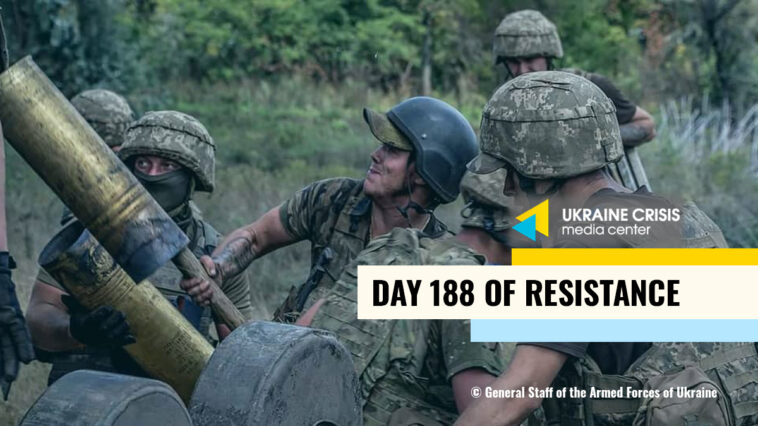More Ukrainian strikes in south
The Ukrainian troops launched more missile and artillery strikes on three bridges in the occupied areas of Kherson region, the Operational Command South (Pivden) said.
The Ukrainian air and missile defense units conducted more than 22 fire attacks on the southern axis, “including attacks on three bridges – the Antonivskyi road bridge, the Antonivskyi rail bridge, and the Dariyivskyi bridge. The attacks were intended to make sure the bridges are not operational,” the Operational Command South said.
On the night of August 29 into August 30, Ukrainian fighter jets conducted two strikes on the sites near Kyselivka and Kostyrka, in Kherson region, where Russia deployed troops and materiel, the Operational Command South said.
Ukraine’s offensive in the south continues, but not at a rapid pace. Reports of the retaken villages in Kherson region are contradictory. CNN earlier said that the Ukrainian troops forced the Russian forces out of Novodmytrivka, Arkhanhelske, Tomyna Balka, and Pravdyne. An unnamed source in the Ukrainian Armed Forces said the reports were partially correct. The Ukrainian troops have some success in Pravdyne, while Tomyna Balka and Novodmytrivka remain in the hands of the Russians, the source added.
Zelenskyi meets with IAEA director-general in Kyiv
On Tuesday, Ukrainian President Volodymyr Zelenskyi met with some of the members of the International Atomic Energy Agency (IAEA) mission headed to the Zaporizhzhia nuclear power plant, including IAEA director-general Rafael Grossi.
Ukraine wants the IAEA mission to reach the Zaporizhzhia nuclear power plant, Zelenskyi said. The station needs to be fully demilitarized, he added.
“We want the IAEA mission led by the director-general Rafael Grossi to reach the plant thanks to our security service and safety routes, and do its utmost to prevent the threats of global scale,” the President said.
“The plant needs to be immediately demilitarized, the Russian forces withdrawn with explosives and all weapons. Once the plant is liberated, and a demilitarized area is established, it needs to pass under Ukraine’s control,” Zelenskyi said.
On Tuesday, experts of the International Atomic Energy Agency arrived in Kyiv. Fourteen members of the mission led by the IAEA director-general will travel to the Zaporizhzhia nuclear power plant later this week. It is unclear if the mission will be able to reach the station.
Five civilians killed in strike on Kharkiv as Russia continues terror
The Russian forces launched a strike on the center of Kharkiv, head of the Kharkiv regional military administration Oleh Synehubov said on Telegram. Five people were killed, and seven more wounded. The strike hit several houses, vehicles, a kindergarten and a park.
Six months of Russian war: How Ukraine withstands aggression. Ukraine in Flames #173
The first days of Russian full-scale invasion showed little optimism for Ukraine in its fight against the aggressor. Foreign politicians, military experts and media speculated that Kyiv will fall to Russian troops – sooner rather than later – and that Ukraine did not stand a chance against the “second army of the world”.
On August 24th Ukraine celebrated its independence day that, at the same time, marked 6 months of an all out war. The war that Ukrainian military, leadership and people have chances to win against all odds. Reality of these 6 months has shown us that the myth of the “mighty Russian army” is just that – only a myth. While the media and the foreign public have grown somewhat accustomed to this and begin to get used to the war, Ukrainians keep living through the horror daily, and they keep up the good fight in spite of constant missile strikes, new horrendous discoveries of the Russian war crimes and all the destruction. Ukraine In Flames #173 provides a brief overview of the key numbers and important features of the Russian war against Ukraine for 6 months after February 24th.
Speaker:
- Tetyana Ogarkova, head of International outreach at Ukraine Crisis Media Center

